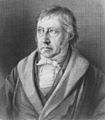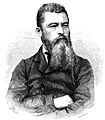Alienation (Marxism) facts for kids
In Marxism, alienation is a feeling that people have when they don't feel connected to the society around them and their work.
According to Marx, there are four types of alienation in a capitalist society:
- Alienation from the product of a person's work
- Alienation from the process of work
- Alienation from others
- Alienation from self
Because of alienation, people have no control over their lives or over the things they make. Instead, the products of their labor are exchanged for wages in order to survive.
Contents
Types of Alienation
Alienation from the product of a person's work
In this type of alienation, a worker cannot relate to the work he or she is doing. For example, someone can screw parts into a toy without seeing the rest of the toy when it is done. This type of alienation increased after people started doing work in assembly lines. Before then, people would make things from start to finish.
Alienation from the process of work
A worker does not control the means of production. He or she just does the things that is taught to them. For example, a worker might need to make shirts in the same style and cannot experiment with patterns or designs.
Alienation from others
In a capitalist society, a worker will be in competition with other workers for a small number of jobs. Because of this, they cannot cooperate with each other and fight for their shared interests as workers.
Alienation from self
Finally, people are alienated from their identity that they get from doing their work. Marx called this identity Gattungswesen (German for "species-essence" or "human nature"). For example, someone who just screws parts into a toy will not feel like a toymaker because he or she is not really "making" toys.
Images for kids
-
19th-century German intellectual Karl Marx (1818–1883) identified and described Entfremdung (alienation of labor) as Laborers not owning the products they labor to create
-
Strikers confronted by soldiers during the 1912 textile factory strike in Lawrence, Massachusetts, United States, called when owners reduced wages after a state law reduced the work week from 56 to 54 hours
-
Philosopher Georg Wilhelm Friedrich Hegel (1770–1831) postulated the idealism that Marx countered with dialectical materialism
-
Philosopher Ludwig Feuerbach (1804–1872) analysed religion from a psychological perspective in The Essence of Christianity (1841) and according to him divinity is humanity's projection of their human nature
See also
 In Spanish: Teoría marxista de la alienación para niños
In Spanish: Teoría marxista de la alienación para niños





